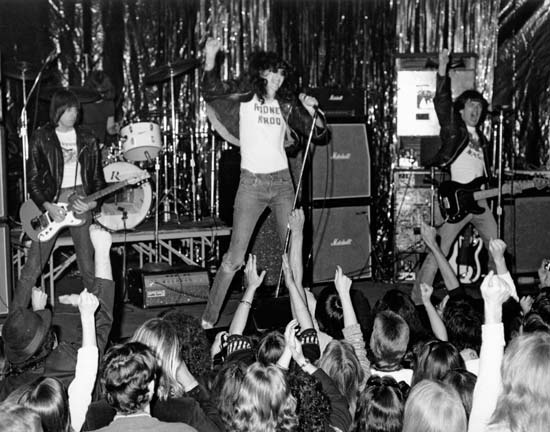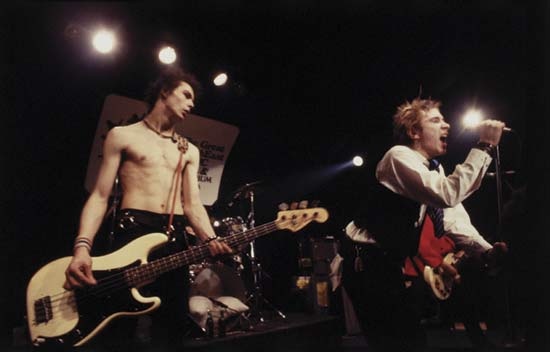punk
music
also known as punk rock
 aggressive form of rock music that coalesced into an international (though predominantly Anglo-American) movement in 1975–80. Often politicized and full of vital energy beneath a sarcastic, hostile facade, punk spread as an ideology and an aesthetic approach, becoming an archetype of teen rebellion and alienation.
aggressive form of rock music that coalesced into an international (though predominantly Anglo-American) movement in 1975–80. Often politicized and full of vital energy beneath a sarcastic, hostile facade, punk spread as an ideology and an aesthetic approach, becoming an archetype of teen rebellion and alienation.Borrowed from prison slang, the word punk was first used in a musical context during the early 1970s, when compilation albums such as Lenny Kaye's Nuggets (1972) created a vogue for simple mid-1960s garage rock by groups such as the Seeds, the 13th Floor Elevators, and ? (Question Mark) and the Mysterians. Meanwhile, other American groups such as the MC5 (MC5, the), Iggy and the Stooges, and the New York Dolls (New York Dolls, the) had begun to use hard rock to reflect and define youthful angst. By 1975 punk had come to describe the minimalist, literary rock scene based around , the New York City club where the Patti Smith (Smith, Patti) Group and Television performed. The Ramones (Ramones, the) also performed there, and their self-titled 1976 debut album became the blueprint for punk: guitar as white noise, drums as texture, and vocals as hostile slogans.
 After the pastoral concerns of the hippies, punk was a celebration of urbanism, a reclaiming of the inner city. The term spread to Britain, where the Sex Pistols (Sex Pistols, the) were packaged by Malcolm McLaren to promote his London store, Sex, which sold fetishistic clothing daubed with slogans from the farthest reaches of 1960s radical politics—e.g., the Paris-based Situationist International. Announced by their manifesto, the single “Anarchy in the U.K.,” the Sex Pistols established punk as a national style that combined confrontational fashions with sped-up hard rock and allusive, socially aware lyrics that addressed the reduced expectations of 1970s teens. Armed with a critique of the music industry and consumerism—embodied in songs such as the Sex Pistols' “EMI” and X-Ray Spex's “Identity”—early British punk spawned a resurgence of interest in rock. Mirroring social upheaval with a series of visionary songs couched in black humour, groups such as the Buzzcocks (“Orgasm Addict”), the Clash (“Complete Control”), and Siouxsie and the Banshees (“Hong Kong Garden”) scored hits in 1977–78. Anarchist, decentralizing, and libertarian, U.K. punk was drawn into the polarized politics of British society and by 1979 had self-destructed as a pop style. Postpunk groups such as Public Image Ltd. and Joy Division (Joy Division/New Order) replaced punk's worldliness with inner concerns, matching rock with the technological rhythms of disco. Nevertheless, punk's influence could be seen throughout British society, notably in mass media shock tactics, the confrontational strategies of environmentalists, and the proliferation of independent record labels.
After the pastoral concerns of the hippies, punk was a celebration of urbanism, a reclaiming of the inner city. The term spread to Britain, where the Sex Pistols (Sex Pistols, the) were packaged by Malcolm McLaren to promote his London store, Sex, which sold fetishistic clothing daubed with slogans from the farthest reaches of 1960s radical politics—e.g., the Paris-based Situationist International. Announced by their manifesto, the single “Anarchy in the U.K.,” the Sex Pistols established punk as a national style that combined confrontational fashions with sped-up hard rock and allusive, socially aware lyrics that addressed the reduced expectations of 1970s teens. Armed with a critique of the music industry and consumerism—embodied in songs such as the Sex Pistols' “EMI” and X-Ray Spex's “Identity”—early British punk spawned a resurgence of interest in rock. Mirroring social upheaval with a series of visionary songs couched in black humour, groups such as the Buzzcocks (“Orgasm Addict”), the Clash (“Complete Control”), and Siouxsie and the Banshees (“Hong Kong Garden”) scored hits in 1977–78. Anarchist, decentralizing, and libertarian, U.K. punk was drawn into the polarized politics of British society and by 1979 had self-destructed as a pop style. Postpunk groups such as Public Image Ltd. and Joy Division (Joy Division/New Order) replaced punk's worldliness with inner concerns, matching rock with the technological rhythms of disco. Nevertheless, punk's influence could be seen throughout British society, notably in mass media shock tactics, the confrontational strategies of environmentalists, and the proliferation of independent record labels.Although the Sex Pistols' 1977 chart successes (principally “God Save the Queen” and “Pretty Vacant”) made Britain the hotbed of the new youth movement, similar developments had occurred in France, Australia, and the United States (notably in Cleveland, Ohio, where the band Pere Ubu played a prominent role). Visits by British groups such as the Damned and the Sex Pistols later fueled prominent regional punk scenes in Seattle, Washington; San Francisco (the Dead Kennedys); and Los Angeles ( X and Black Flag). In the late 1970s, however, punk in the United States was eclipsed by disco and went underground in movements such as hardcore, which flourished from the early to mid-1980s and further accelerated punk's breakneck tempo. Punk's full impact came only after the success of Nirvana in 1991, coinciding with the ascendance of Generation X—a new, disaffected generation born in the 1960s, many members of which identified with punk's charged, often contradictory mix of intelligence, simplicity, anger, and powerlessness.
Additional Reading
Greil Marcus, Lipstick Traces: A Secret History of the Twentieth Century (1989), analyzes the impact of punk music. Jon Savage, England's Dreaming (1991), covers the Sex Pistols and the origins of punk music. John Lydon, Keith Zimmerman, and Kent Zimmerman, Rotten: No Irish, No Blacks, No Dogs (1994), presents the Sex Pistols' Johnny Rotten's varied views on many topics, including punk.
- flag of Iraq
- flag of Ireland
- flag of Israel
- flag of Italy
- flag of Jamaica
- flag of Japan
- flag of Jersey
- flag of Jordan
- flag of Kansas
- flag of Kazakhstan
- flag of Kentucky
- flag of Kenya
- flag of Kiribati
- flag of Korea, North
- flag of Korea, South
- flag of Kuwait
- flag of Kyrgyzstan
- flag of Laos
- flag of Latvia
- flag of Lebanon
- flag of Lesotho
- flag of Liberia
- flag of Libya
- flag of Liechtenstein
- flag of Lithuania